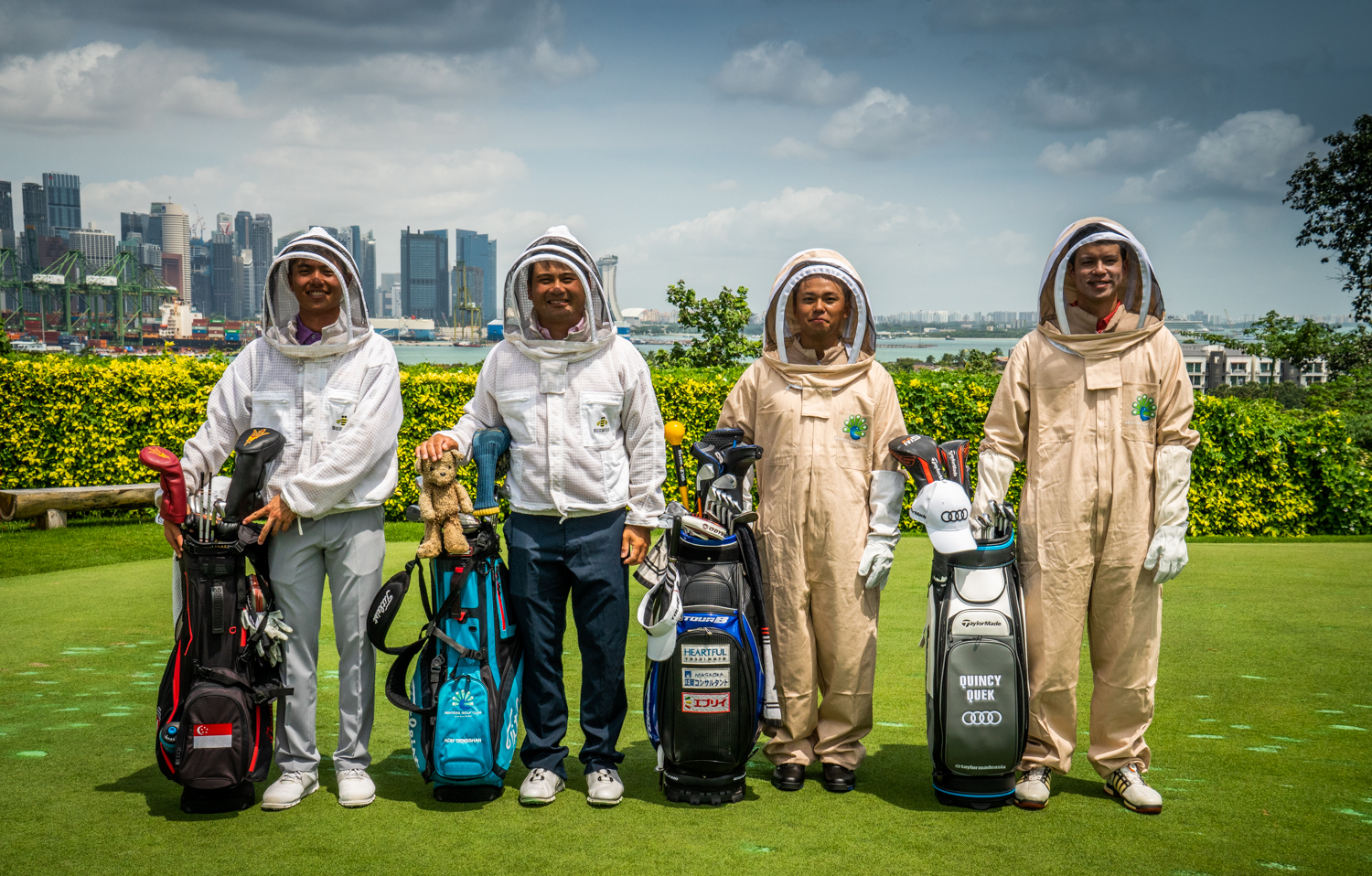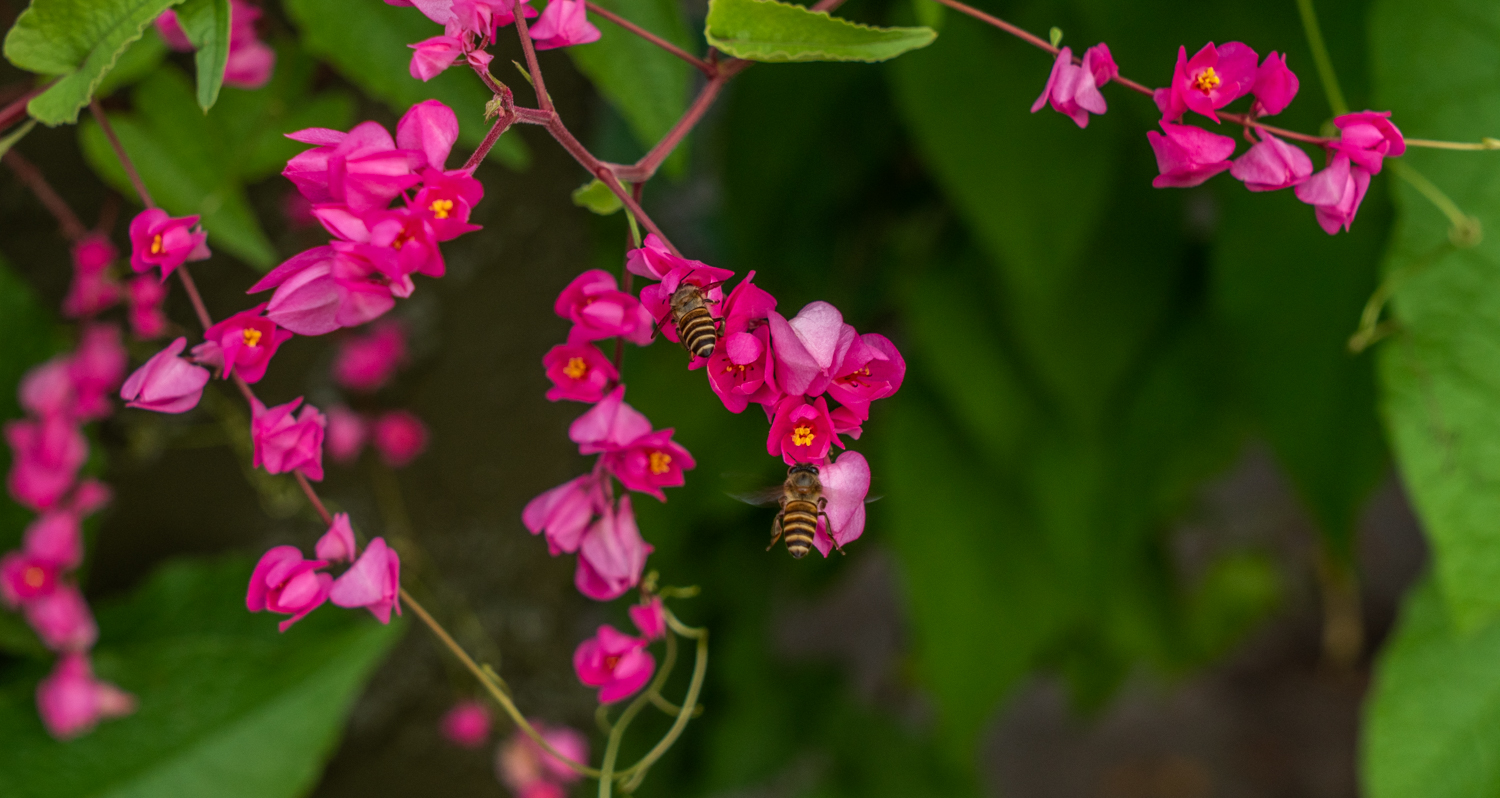Asian Tour Players Buzzing at Sentosa Golf Club

Asian Tour players James Leow, Quincy Quek, Koh Deng Shan, Naoki Seikto try beekeeping.
Asian Tour players joined Sentosa Golf Club this week for a spot of beekeeping, helping the club unveil its intentions for a new campaign called GAME ON, designed to make the golfing community aware of the global threat of climate change.
Local Singaporean players James Leow, Quincy Quek, Koh Deng Shan and Japanese player, Naoki Sekito, took a break from their preparations at the SMBC Singapore Open to learn more about the beekeeping practice, used by Sentosa Golf Club as one of its environmental initiatives.
The bee population is declining, down by 70% worldwide. With one-third of the food we eat relying on pollination by bees, Sentosa Golf Club believes that creating just a few colonies on a golf course can make a difference. With four colonies in existence currently, the club has ambitions to grow to 40 within 12 months.
The players even donned beekeeping suits and took on the iconic 4th hole on The New Tanjong, the location of Sentosa’s bee sanctuary, which is managed by local professional beekeeper, John Chong, from Bee Amazed.
Voted the ‘World’s Best Golf Club’ at the World Golf Awards, the host venue of the SMBC Singapore Open has revealed GAME ON, a model that will educate and inspire the golf industry and better equip them to introduce modern sustainability practices, reducing a golf club’s environmental impact, as well as improving the quality of facilities on offer throughout the world.

Sentosa Golf Club has plans to increase its bee colonies to 40
The model, which will become available in March as a free downloadable toolkit from the Sentosa Golf Club website, has been developed by one of the world’s leading agronomists, Andrew Johnston, General Manager and Director of Agronomy at Sentosa Golf Club, who has more than 30 years of experience in golf operations. Johnston is also one of the leading figures in the golf industry when it comes to sustainability, helping Sentosa to become one of the most recognised eco-friendly golf facilities in the world through the measures he has implemented.
With over 61 million golfers and 39,000 golf courses worldwide, GAME ON will help the industry to unite and work together to reduce golf’s carbon footprint, making it one of the leading industries to help make a difference on climate change.
In recent years, Sentosa Golf Club has increased exposure for its own sustainable initiatives through the development of the #KeepItGreen campaign, which launched at the 2018 SMBC Singapore Open and has now become a way of life at the club. Under its umbrella, Sentosa continues to undertake a wide range of actions to reduce its environmental footprint, both on and off the course.
Speaking about the launch of GAME ON at the SMBC Singapore Open, Andrew Johnston, General Manager and Director of Agronomy at Sentosa Golf Club, said: “GAME ON will target the relevant issues that both golf and the world faces in its fight against climate change. Sentosa Golf Club is proud to be at the forefront of this campaign and hope to create a legacy with golf’s leading organisations and community that will have a huge bearing on our future. Being able to launch the GAME ON campaign at an event like the SMBC Singapore Open is crucial to allowing us to spread our message to a wider international audience and encourage change within the game of golf.
“As for bees, we often hear the saying that the end of bees will signal the end of the world, so we’re really proud to be able to showcase this technique through our sanctuary here at the club and look forward to seeing it grow in the months to come.”
Talking about his experience at Sentosa’s bee colonies, Quincy Quek, one of Singapore’s rising golf stars, said: “Never for a moment when I arrived here at Sentosa Golf Club did I think I would get to experience beekeeping. I didn’t even realise they had bee colonies here! It’s a really nice green initiative they have, one which is so simple for other clubs to implement and I learned how it can really make a difference. It also made me think how important it is to consider the impact golf is having on climate change and how we can do our bit to tackle the issue. It’s an important one for my generation to understand, even more so for the next generation coming through.”
Search
Other News
- Sentosa Golf Club Enters 10-Year Partnership with Toro
- Andrew Johnston Hits Heights with Sentosa to Become One of the ‘Most Innovative People in Golf’
- Sentosa Golf Club’s Serapong All Primed to Host the SMBC Singapore Open
- Malaysia’s Gavin Green Back in Action at the Singapore International
- Korean Stars Im and Lee Hope to Start New Year With Some Fireworks
- Nostalgic Asian Tour Return for Charlie Wi
- Royal’s Cup to Debut on Asian Tour in 2022 at Grand Prix Golf Club
- New Year Cruise for Khalid at Faldo Series Pakistan Championship
- Reed, Finau, Smith Join the World’s Best With the PIF Announced as New Title Sponsor for Saudi International powered by Softbank Investment Advisers
- Paul Casey to Commence 2022 at SMBC Singapore Open
- More news...